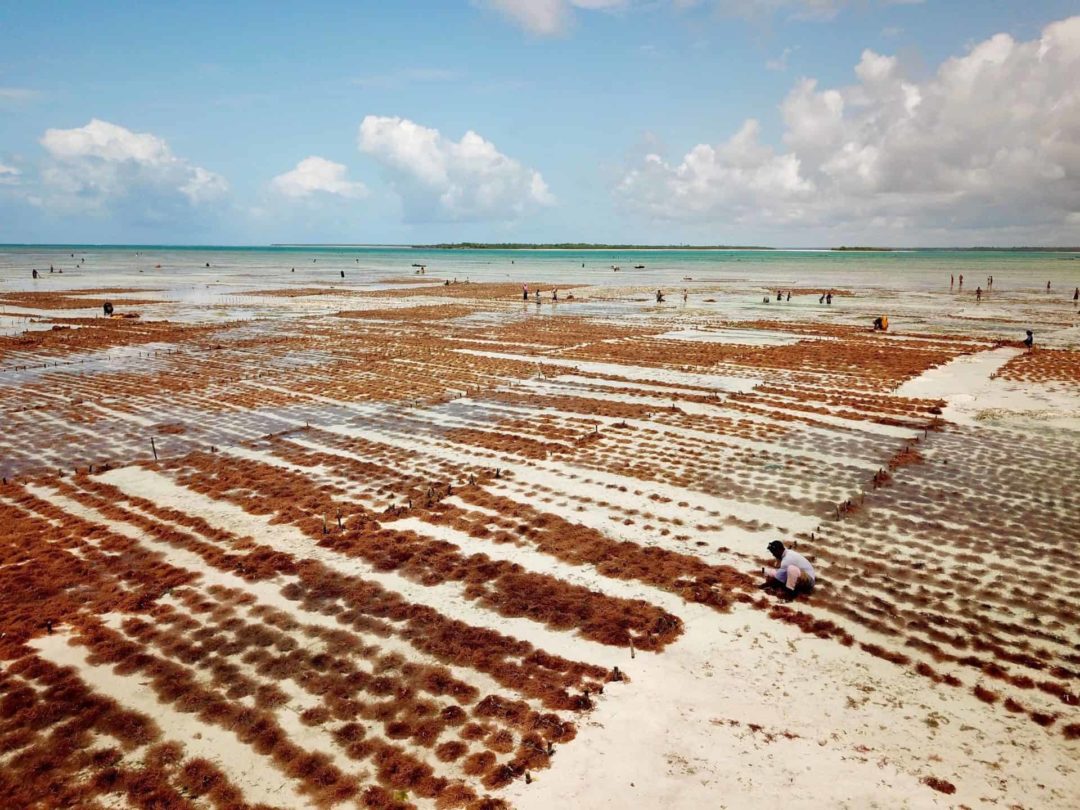Seaweed aquaculture is one of Zanzibar’s largest export businesses, according to a press release, employing more than 25,000 people, 80% of whom are women. The release says demand for seaweed is expected to increase, since it is a raw material used in a variety of increasingly popular products from confectionary to yogurts to cosmetics. Seaweed aquaculture can also provides benefits to the planet, including improved water quality and conservation of wildlife habitats.
However, TNC and Cargill caution, seaweed farming must be done sustainably to provide these benefits. The release points out that warming oceans due to climate change, impacts of coastal development, limited aquaculture knowledge, and poor seed stocks are combining to make it harder for seaweed farmers to sustainably and cost effectively keep up their yields and maintain their livelihoods. Instead, the release contends, some are using inappropriate farming practices that amplify negative impacts to the fragile marine environments that their businesses need to thrive.
Through this pilot program, the groups will work with farmers with a goal to increase seaweed farming productivity, improve environmental performance, improve livelihoods, and empower women. In the first year of the project, TNC will train more than 100 farmers on how best to site, design, and manage their farms and to increase yields while also reducing farming impacts such as impacts to seagrass, mangrove areas, and marine debris on beaches and waterways, the release says. The program also will identify, train, and mentor individuals to be "village implementers" to mentor other farmers, build local capacity, and ensure farmers involved will have a local specialist to consult.
“Our research shows that when farmed well, seaweed has the unique ability to improve ocean health by providing benefits to water quality and providing habitat for wild fish, in addition to providing a low impact form of jobs in rural coastal communities," Robert Jones, Global Lead for Aquaculture for The Nature Conservancy, said in the release. "And we’ve determined that the marine areas in which seaweed farming is most established in Tanzania are among the highest priority locations to protect anywhere in Africa. Protecting these areas and educating and partnering with women seaweed farmers is a new and important focus of our conservation work in Tanzania and our work with the aquaculture sector globally. Through improved seaweed farming practices that better long-term farming yields and incomes, we aim to help coastal communities become more resilient to environmental change and economic shocks, such as impacts from COVID-19, which is affecting the local tourism sector.”
The program also will help to ensure that volumes of sustainably farmed seaweed continue to grow for the industry and is traceable through the supply chain, to assure end producers of the social and environmental responsibility of seaweed production. And to help ensure a long-term sustainable red seaweed supply chain, in 2019Cargilllaunched its Red Seaweed Promise, a program designed to address sustainability challenges of harvesting and cultivating red seaweed, while enhancing producers’ livelihoods, supporting local communities, and conserving the marine environment.
Sebastien Jan, Seaweed Sourcing and Sustainability Project Manager at Cargill, said: “The Red Seaweed Promise was launched a year ago with the ambition to enable seaweed producers and their communities to achieve better incomes and living standards in a way that will accelerate progress towards a sustainable and transparent global seaweed supply chain. This new partnership with The Nature Conservancy is one among various initiatives we are excited to announce today that will focus on empowering seaweed producers, improving production & harvesting practices, community support and strengthening partnerships, our four impact areas to deliver on our promise.”










